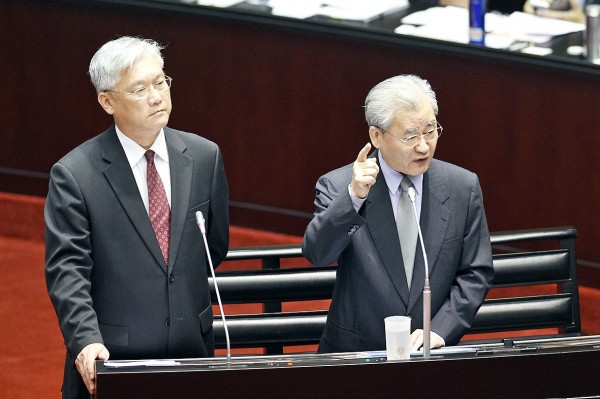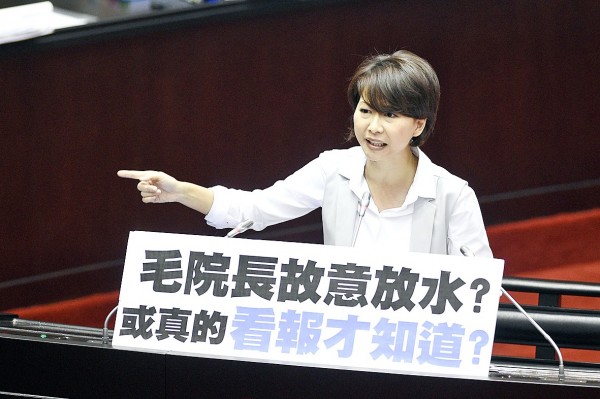《TAIPEI TIMES 焦點》 Cancel cross-strait talks on travel document: legislator

Premier Mao Chi-kuo, right, is joined by Mainland Affairs Council Minister Andrew Hsia as he answers questions on China’s new card-style “compatriot travel document” in the Legislative Yuan in Taipei yesterday. Photo: George Tsorng, Taipei Times
By Alison Hsiao / Staff reporter
A Chinese Nationalist Party (KMT) lawmaker’s suggestion to call off a top-level cross-strait meeting scheduled for next month to demonstrate Taiwan’s unhappiness with China’s high-handed introduction of a new travel pass for Taiwanese would be considered, Premier Mao Chi-kuo (毛治國) said yesterday, although he stressed that China’s Taiwan Affairs Office (TAO) has responded positively to Taipei’s complaints.
KMT Legislator Lu Hsiu-yen (盧秀燕) said China’s unilateral move to replace its paper “Taiwan compatriot travel document” (台胞證) with a smart-card pass was a slap in the face to President Ma Ying-jeou (馬英九), the premier and Mainland Affairs Council Minister Andrew Hsia (夏立言).
If Taiwan’s government simply delivered an oral protest, it “would be looked down on by both its people and the Chinese government,” Lu said, as she told Cabinet ministers the meeting scheduled for next month between Hsia and TAO Minister Zhang Zhijun (張志軍) should be scrapped.
Beijing’s decision to introduce the microchip card without first discussing it with the Mainland Affairs Council dominated the question-and-answer session in the Legislative Yuan for a second day yesterday, with lawmakers across party lines grilling Cabinet members about the new pass.
Mao told Lu that the TAO has made positive responses after the government lodged a complaint, confirming that the card is to be used in the same way as the paper document it replaced.
Hsia told lawmakers concerns that the chip could be used to electronically track Taiwanese or that their personal data could be compromised were misplaced.
The chip in the card has been studied and found to contain one-time programming, with just 0.1MB capacity.
“It is not designed for tracing or transmitting, nor is it able to carry biological traits,” the minister said.
The premier said the government had made several requests.
“We have requested that if major changes to the existing measures are to be made, they have to be discussed by the two sides via official channels and only put into effect after a consensus has been reached,” Mao said.
Democratic Progressive Party Legislator Chen Ting-fei (陳亭妃) said if the only kind of protest the government offered was words of dissatisfaction, there would be no end to such offenses by the Chinese.
Mao told Chen that the Chinese government should know that “discontent is something that accumulates.”
On Monday in Beijing, TAO spokesman Ma Xiaoguang (馬曉光) said that the card was simply an electronic version of the paper travel document, valid for five years, which would streamline entry and exit processes.
“Since the people on the two sides of the Taiwan Strait are one family, the change is for the convenience and better exchange [of the two peoples] and has received a warm welcome from people of both sides, especially the Taiwanese public,” the spokesperson said.
The Taiwan Solidarity Union on Monday said that the Chinese government has rammed its policy down the throats of the Taiwanese and was trying to “make the Taiwanese part of its domestic business.”
It called on the Ma administration to respond in kind by eliminating the entry document now used by Chinese visitors in favor of visas stamped directly onto their Chinese passports.
新聞來源:TAIPEI TIMES

Democratic Progressive Party Legislator Chen Ting-fei points as she asks a question in the Legislative Yuan in Taipei yesterday. She voiced doubts as to whether Premier Mao Chi-kuo really only found out about the change to China’s compatriot travel passes through the media. Photo: George Tsorng, Taipei Times




















